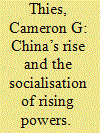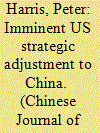|
|
|
Sort Order |
|
|
|
Items / Page
|
|
|
|
|
|
|
| Srl | Item |
| 1 |
ID:
140825


|
|
|
|
|
| Summary/Abstract |
This article critically explores the historical transformation of the normative structure of international order brought about by legitimacy contests, and unpacks how power is deeply implicated in legitimacy claims amid the ongoing normative transformation of contemporary international society by virtue of the vanishing American unipolarity. By situating the analytical concept of legitimacy at the centre of this inquiry, it examines China’s attempts to win and command social acceptance of the legitimacy of its rising power as it confronts the challenges posed by the changing normative structure of contemporary international society. The struggle for legitimacy of a rising power, it argues, provides an alternative analytical framework within which to understand how rising Chinese power contests and is contested by the liberal global order dominated by the United States, a question that has fascinated and consumed many realist, liberal, and constructivist scholars. China’s engagement with the politics of legitimation is central to China’s peaceful rise. A careful examination of China’s struggle for legitimacy can yield insights into important systemic consequences of the transformation of the normative structure of international society.
|
|
|
|
|
|
|
|
|
|
|
|
|
|
|
|
| 2 |
ID:
140824


|
|
|
|
|
| Summary/Abstract |
The rise of China, and other states whose material power and ideational aspirations have outpaced that of their peers, presents an interesting challenge to international relations theorists. Structural theories rooted in realism tend to predict that changes in material power inexorably lead to conflict that reshuffles the pecking order at the pinnacle of the international system. Such theories also tend to ignore identity and other ideational factors that may condition the interaction of rising and dominant great powers. This article develops a theoretical approach to state socialisation of rising powers. While considering the importance of increasing material capabilities, this approach also examines the types of roles that states occupy in the international social system and the ability of great powers to socialise rising powers into what they consider to be appropriate roles. The 1995–1996 Taiwan Straits Crisis is analysed through this theoretical framework to demonstrate that although both China and the United States attempted to altercast each other in a socialisation process, neither was successful. China pursued its own, self-conceived role conceptions in the situation, as did the United States, setting the stage for renewed rivalry between the two powerful states. The case demonstrates the difficulty of constraining rising powers’ aspirations when their material power allows them to pursue the identities of their choice, even in the face of strong socialisation efforts from the dominant power and its supporters.
|
|
|
|
|
|
|
|
|
|
|
|
|
|
|
|
| 3 |
ID:
140823


|
|
|
|
|
| Summary/Abstract |
‘Thinking sets’ refer to particular aspects of knowledge, or ideas, which upon accumulation and dissemination are institutionalized as a means of understanding a phenomenon or actor, and which enable the understanding of its internal logic or the thinking which guides its behaviour, its content, and its expectations and preferences. Since the 1990s, a number of dominant thinking sets have emerged within Chinese foreign policy research circles, including: keeping a low profile, non-alignment, never taking the lead, China will not become a superpower, priority to Sino–US relations, and diplomacy serving economic development. For many years, these thinking sets helped our understanding of the objectives and trends of China’s foreign policy. In more recent years, as Chinese foreign policy has adapted, it is now important to reflect upon and discuss the direction in which these thinking sets might evolve. In particular, how Chinese foreign policy analysts should understand the relationship between Deng Xiaoping’s ‘28 character guidelines for foreign policy’ and the spirit of the 2013 Working Conference on Neighbouring State Diplomacy and, more specifically, the relationship between ‘keeping a low profile’ and ‘striving for achievement’, will determine the ongoing relevance of these thinking sets.
|
|
|
|
|
|
|
|
|
|
|
|
|
|
|
|
| 4 |
ID:
140822


|
|
|
|
|
| Summary/Abstract |
How can leaders in the United States and China ensure that future relations between their two countries are marked by peaceful cooperation and not conflict over the organization of world politics? Whereas most scholarly writing on the topic of China’s ‘peaceful rise’ has dwelt upon the ways and means by which Chinese leaders can steer their ship of state towards harmonious relations with the outside world, this article attempts to shift the focus onto foreign policy-making by the United States. The argument is that established states preside over a range of options when it comes to deciding how to respond to rising states during periods of shifting power and how they choose to adjust to an adverse alteration in relative power has dramatic consequences for the subsequent evolution of any given power-transitional dyad and, by extension, for the course of world politics more broadly. The author provides a conceptual framing of this function for established great powers during episodes of shifting power and seeks to elucidate in particular the domestic–political components of the role. The primary policy implication is to suggest that decision makers in the United States ought to be ready—much more ready than they currently are—to assume a hefty slice of responsibility for the ensuing power transition with China that most observers anticipate to be in the offing.
|
|
|
|
|
|
|
|
|
|
|
|
|
|
|
|
|
|
|
|
|